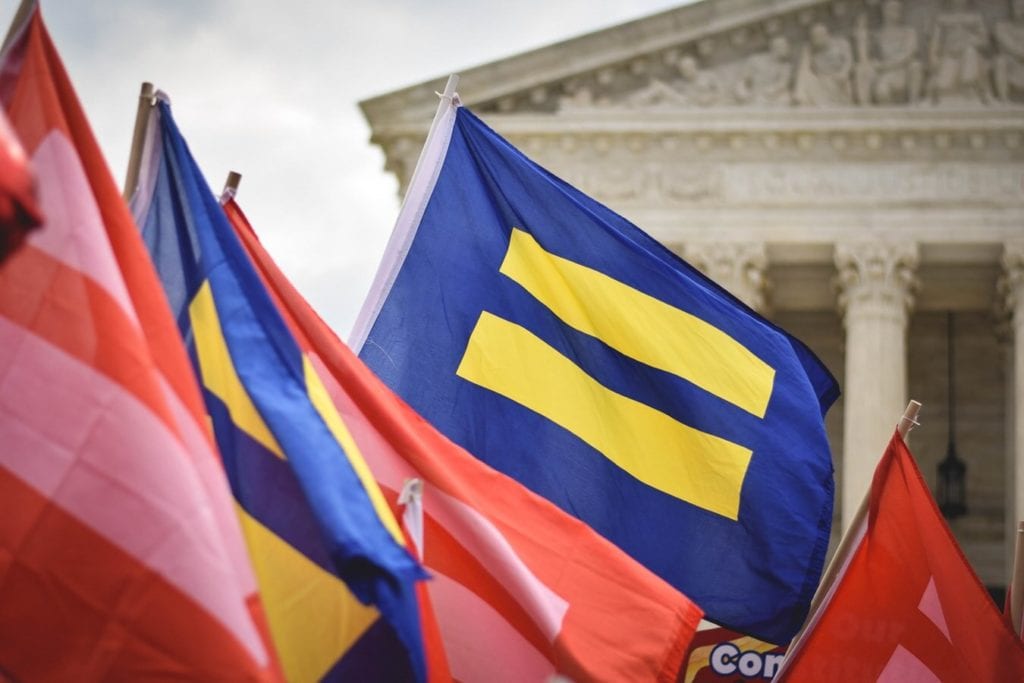The Supreme Court took on LGBTQ in oral arguments on Tuesday in a string of three cases, all centering on the meaning of the word “sex” in connection with Title VII of the Civil Rights Act, the landmark civil rights law that forbids discrimination based on race, color, religion, sex, or national origin without explicitly including gender identity or sexual orientation as falling within the category of “sex.” The oral arguments come as a result of three separate lawsuits, two filed by gay men and one by a transgender woman, who claim they were fired from their jobs because of their gender and sexual identities.
The court’s nine justices appeared to be split during the two hours of oral arguments by lawyers for the plaintiffs – Gerald Bostock, a gay man fired from his job as a child welfare services worker by Clayton County, Georgia, the late Donald Zarda, a gay man fired from his job as a skydiving instructor by New York-based Altitude Express, and Aimee Stephens, a transgender woman who was fired from a Detroit funeral home after informing her employer that she would begin transitioning – and their former employers. At least a few of the judges seemed to agree that such an expansion of Title VII to federally prohibit discriminated based on gender identity or sexual orientation would be a job for Congress and not the nation’s highest court, an argument initially put forth by U.S. Solicitor General Noel Francisco, arguing in favor of the employers.
Justice Samuel Alito, for one, stated that Congress has had the opportunity to – and has opted not to – expand the protections provided by Title VII since it was first enacted in 1964. If the court were to determine that the law does, in fact, apply to gay and transgender employees, and thereby, prevents companies from making employment decisions on this basis, “We will be acting exactly like a legislature,” he said.
He further argued that Congress was not intending to decide “whether Title VII should prohibit discrimination on the basis of sexual orientation” when it passed the law in 1964, something that Justice Ruth Bader Ginsburg appeared to take issue with, noting that Congress was not thinking about sexual harassment then, either, and yet, the courts have since ruled that it is such harassment is prohibited by the civil rights law.
Another seemingly pro-plaintiff member of the court Justice Sonia Sotomayor, asked, “At what point does a court continue to allow invidious discrimination? We can’t deny that homosexuals are being fired just for who they are.”
The three cases before the court come several years after Saks Fifth Avenue has named in a since-settled discrimination lawsuit brought in a Texas federal court in September 2014 by a former employee, who alleged that she was harassed for being transgender. Then 22-year old Leyth Jamal asserted in her complaint that her managers at a Saks store in Houston constantly referred to her as a man, instructed her to use the men’s restroom and pressured her to change her appearance to a more masculine one, despite being aware of her transgender identity. Jamal claimed that when she made a gender-based discrimination complaint to the Equal Employment Opportunity Commission, she was fired.
In response to the lawsuit, which was “amicably settled” almost a year after it was filed, according to counsel for Jamal, Saks argued that the case should be dismissed because “transsexuals are not a protected class” under Title VII of the Civil Rights Act of 1964. Counsel for Saks claimed at the time that Jamal “based her case not on sex discrimination but on the issue of gender identity and transgender status,” which the lawyer said some courts have ruled fall outside Title VII’s mandate. Saks will follow that precedent, the retailer said, “unless or until it is modified by the courts or the legislature.”
On the heels of that filing, Saks, faced with an immense amount of media scrutiny, withdrew its motion to dismiss the lawsuit on the grounds that Title VII of the Civil Rights Act of 1964 does not protect transgender workers. In addition, the U.S. Department of Justice filed a statement of interest in the case, while New York’s Attorney General Eric Schneiderman said that his office was investigating Saks’ treatment of transgender employees, including how its trains employees on workplace harassment and how – exactly – it handles file harassment or discrimination complaints made by employees.











